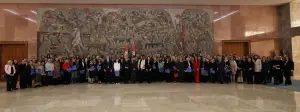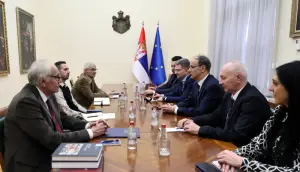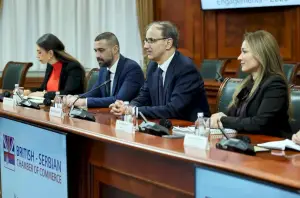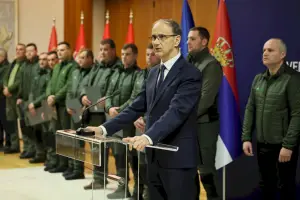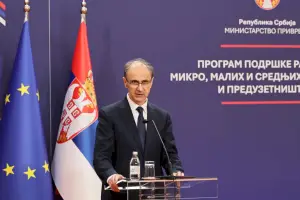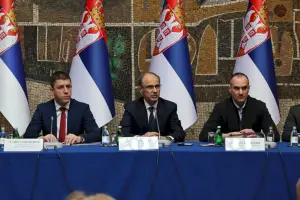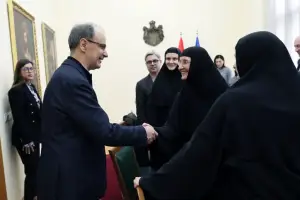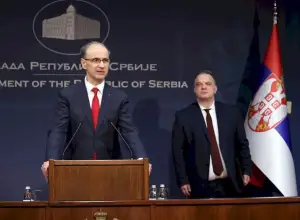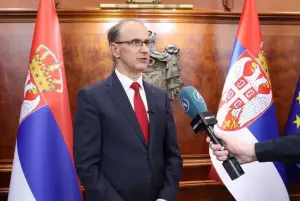Top officials of the European Union and NATO have agreed that the situation in Kosovo-Metohija is serious and that KFOR must step up efforts to protect Serbs and other non-Albanians in the province, said Serbian Prime Minister Vojislav Kostunica upon his return from Brussels and Paris last night. Brussels officials reiterated that the March 17 attacks in Kosovo were orchestrated and that all Serb homes must be rebuild, said Kostunica and added that they also showed interest in a plan to decentralise the province.
Q:
A:
Demolished houses in Kosovo must be rebuilt, say EU, NATO heads
Belgrade/Brussels,
24 March 2004
Kostunica visited Brussels and Paris on Tuesday for talks with European Commission President Romano Prodi, NATO Secretary General Jaap de Hoop Scheffer and French Foreign Minister Dominique de Villepin, who all pointed out that the consequences of the recent events in Kosovo must be eliminated.
Kostunica attached particular importance to de Hoop Scheffer's statement that all demolished houses in Kosovo must be rebuilt.
This statement by NATO Secretary General not only shows a resolve to restore safety for those who were victimised by terrorists and left homeless but also sends a clear political message to extremists and terrorists that NATO will not let such acts happen again, according to Kostunica.
Asked by reporters who will rebuild the destroyed houses, Kostunica said it is "very important that those who bore the most responsibility for preventing the recent events in Kosovo-Metohija - NATO and KFOR - were the ones to use that word."
Kostunica said the talks also touched on hidden, though much more widespread, ethnic cleansing than the one that took place on March 17, given that many Serbs had left Kosovo-Metohija before that day.
At the meeting in Brussels, Kostunica also mentioned a decentralisation of power in Kosovo-Metohija as a possible political solution for the province. Prodi, as well as other EU officials, showed interest in the idea and expressed the need for its clarification. Kostunica reiterated that a new institutional solution is needed in order to ensure safety for Serbs and other non-Albanians in Kosovo, both in places where they are a majority and in those where they are a minority.
The talks in Brussels also focused on relations between Serbia and Montenegro, and the state union's accession to the EU, Kostunica went on to say, adding that both sides agreed that the strengthening of Serbia-Montenegro's institutions has both political and economic importance.
The Prime Minister said that the state union is expected to appoint judges and members of all parliamentary boards, approve the parliament's standing orders and pass much needed legislation.
Serbia and Montenegro are ready to resume talks on the action plan to harmonise their economic relations and establish quotas for the remaining 56 agricultural products, said Kostunica, adding that he expects the EU to assist and back the negotiations.
The EU can also help Serbia and Montenegro seize an opportunity to negotiate a customs arrangement to further strengthen the state union's political framework, the Prime Minister noted.
All participants in yesterday's talks agreed that the stability of Serbia-Montenegro is of utmost importance for the stability in the region, said Kostunica.
The talks also touched on the problems straining the relations between the two state union members, including corruption and the suspension of a preferential status for Serbian sugar exports, which the Prime Minister said may create additional problems ahead of signing a textile export arrangement.
Stressing that the government is determined to pin down the real culprits in the "sugar scam," Kostunica said that the ministries of finance and interior have set up a joint working group to probe sugar exports.
The talks with the NATO Secretary-General focused on Serbia-Montenegro's membership in the Partnership for Peace, which Kostunica said is of high importance for regional stability.
There would be no conflicts or violence such as those in Kosovo-Metohija if all countries in the region were members of a single defence and security association such as the Partnership for Peace, the Prime Minister stressed.
The meeting also touched on Serbia-Montenegro's cooperation with the UN war crimes tribunal in The Hague, seen as the main obstacle to the state union's membership in the Partnership for Peace and its integration into European institutions. Kostunica said that the Serbian government and Serbia-Montenegro are aware of their international obligations but added that certain trials should be held before domestic courts.
Wrapping up his visit to Brussels and Paris, Kostunica met with representatives of the Diaspora who expressed interest in voting in the forthcoming elections and wanted to learn more about Serbia's investment opportunities and the activities of the Ministry of Diaspora.
Kostunica attached particular importance to de Hoop Scheffer's statement that all demolished houses in Kosovo must be rebuilt.
This statement by NATO Secretary General not only shows a resolve to restore safety for those who were victimised by terrorists and left homeless but also sends a clear political message to extremists and terrorists that NATO will not let such acts happen again, according to Kostunica.
Asked by reporters who will rebuild the destroyed houses, Kostunica said it is "very important that those who bore the most responsibility for preventing the recent events in Kosovo-Metohija - NATO and KFOR - were the ones to use that word."
Kostunica said the talks also touched on hidden, though much more widespread, ethnic cleansing than the one that took place on March 17, given that many Serbs had left Kosovo-Metohija before that day.
At the meeting in Brussels, Kostunica also mentioned a decentralisation of power in Kosovo-Metohija as a possible political solution for the province. Prodi, as well as other EU officials, showed interest in the idea and expressed the need for its clarification. Kostunica reiterated that a new institutional solution is needed in order to ensure safety for Serbs and other non-Albanians in Kosovo, both in places where they are a majority and in those where they are a minority.
The talks in Brussels also focused on relations between Serbia and Montenegro, and the state union's accession to the EU, Kostunica went on to say, adding that both sides agreed that the strengthening of Serbia-Montenegro's institutions has both political and economic importance.
The Prime Minister said that the state union is expected to appoint judges and members of all parliamentary boards, approve the parliament's standing orders and pass much needed legislation.
Serbia and Montenegro are ready to resume talks on the action plan to harmonise their economic relations and establish quotas for the remaining 56 agricultural products, said Kostunica, adding that he expects the EU to assist and back the negotiations.
The EU can also help Serbia and Montenegro seize an opportunity to negotiate a customs arrangement to further strengthen the state union's political framework, the Prime Minister noted.
All participants in yesterday's talks agreed that the stability of Serbia-Montenegro is of utmost importance for the stability in the region, said Kostunica.
The talks also touched on the problems straining the relations between the two state union members, including corruption and the suspension of a preferential status for Serbian sugar exports, which the Prime Minister said may create additional problems ahead of signing a textile export arrangement.
Stressing that the government is determined to pin down the real culprits in the "sugar scam," Kostunica said that the ministries of finance and interior have set up a joint working group to probe sugar exports.
The talks with the NATO Secretary-General focused on Serbia-Montenegro's membership in the Partnership for Peace, which Kostunica said is of high importance for regional stability.
There would be no conflicts or violence such as those in Kosovo-Metohija if all countries in the region were members of a single defence and security association such as the Partnership for Peace, the Prime Minister stressed.
The meeting also touched on Serbia-Montenegro's cooperation with the UN war crimes tribunal in The Hague, seen as the main obstacle to the state union's membership in the Partnership for Peace and its integration into European institutions. Kostunica said that the Serbian government and Serbia-Montenegro are aware of their international obligations but added that certain trials should be held before domestic courts.
Wrapping up his visit to Brussels and Paris, Kostunica met with representatives of the Diaspora who expressed interest in voting in the forthcoming elections and wanted to learn more about Serbia's investment opportunities and the activities of the Ministry of Diaspora.



